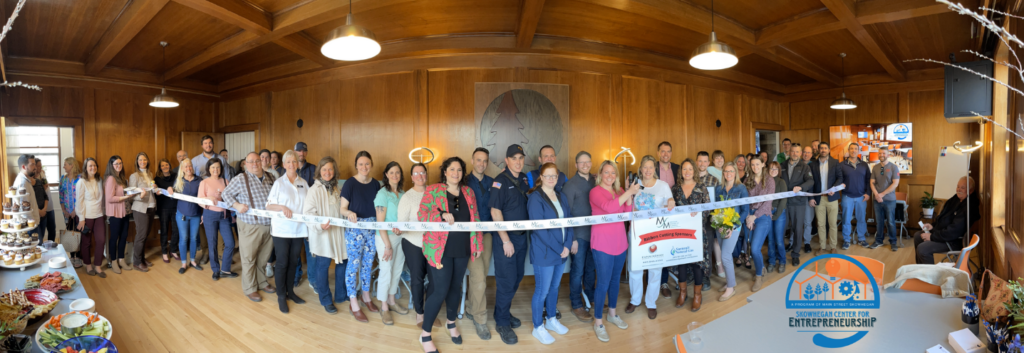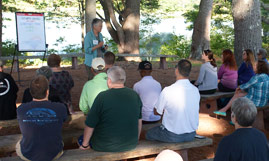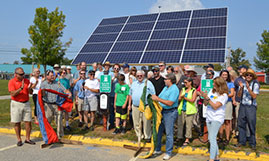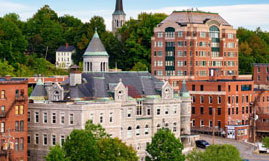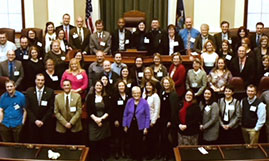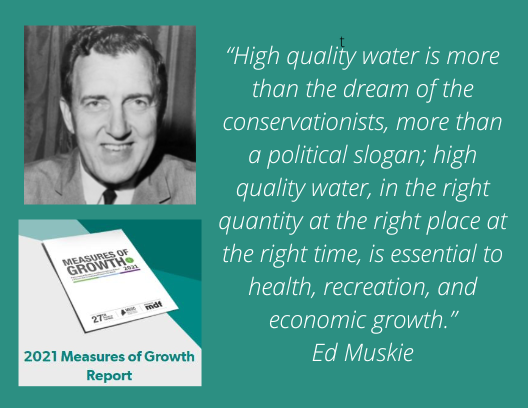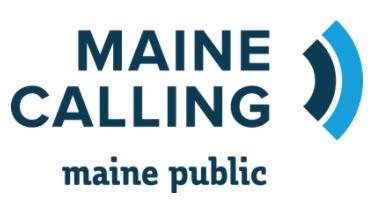Hallowell, Maine— October 13, 2021 — The Maine Development Foundation (MDF), a statewide, nonpartisan, and data-driven nonprofit that connects people and strategies to drive economic improvement, is pleased to announce the election of our 2021-2022 Board of Directors. MDF Member organizations, businesses, and individuals cast their votes virtually during “Maine Rising: MDF’s 43rd Annual Meeting and Champion Award Celebration” which was held via Livestream on September 24, 2021.
Madeleine Braun, Chief of Presidential Initiatives for The Jackson Laboratory, was elected Board Chair, Joy Barresi Saucier, Executive Director of Aroostook Agency on Aging Vice Chair, Treasurer Thomas Francoeur, Senior Managing Scientist, VHB, Inc., Treasurer.
“It is both my and The Jackson Laboratory’s privilege to be associated with MDF in a very deep and meaningful way,” said Madeleine Braun, incoming MDF Board Chair. “Never before has the mission of MDF been more critical, staking claim to the nonpartisan center with data-driven assessments of Maine’s economic realities and opportunities. MDF weaves the regions, sectors, and viewpoints of Maine together to forge consensus and common ground like no other organization does.”
MDF welcomes new Board members Lisa Sockabasin, Director of Wabanaki Public Health (WPH) and Linda Ball, Vice President of Customer Service, Central Maine Power Company.
Lisa is a citizen of the Passamaquoddy Tribe at Motahkomikuk with extensive experience and expertise in Tribal, State, and Federal governments, non-profits, and philanthropic organizations. In her capacity as the Director of Wabanaki Public Health, she collaborates with tribal leadership, the WPH team, and philanthropic partners to address systemic inequities experienced by Wabanaki communities in Maine and to develop and implement culturally based programs that respond to the needs of our communities. Lisa has over 19 years of experience addressing inequities experienced by and providing opportunities to tribal populations.
Linda started with Central Maine Power as a customer service representative more than 20 years ago and has worked her way through the organization, always focused on making CMP a company that is dedicated to the needs of every individual customer. Linda is determined to help CMP improve and to help the team resolve customer issues efficiently and satisfactorily. Linda works to use her position to improve the CMP customer experience.
MDF is grateful to our continuing Board members Dan Bookham, Director of Business Development Allen Insurance and Financial; Scott Blake, SVP, Chief Information Officer Bangor Savings Bank; Eric Soelberg, Vice President, Customer Insights & Planning L.L. Bean, Inc.; Meredith Strang Burgess, President & CEO Burgess Advertising & Marketing; Lori Dwyer, President & CEO, Penobscot Community Health Care; Amy Landry, Executive Director Androscoggin Valley Council of Governments (AVCOG); Dr. Hannah Carter, Dean, UMaine Cooperative Extension, University of Maine; Catherine Wygant Fossett, Executive Director Institute for Family Owned Businesses; and the Governor’s Appointed Ex-Officio Directors Carlos Mello, Finance Authority of Maine and Deborah Johnson, Director, Office of Community Development at the Maine Dept. of Economic and Community Development.
MDF owes special gratitude and recognition to our outgoing Board Chair, Al Raymond, Vice President – Chief Compliance Officer, AVANGRID, Inc., for his steadfast and compassionate leadership during the ongoing pandemic.
